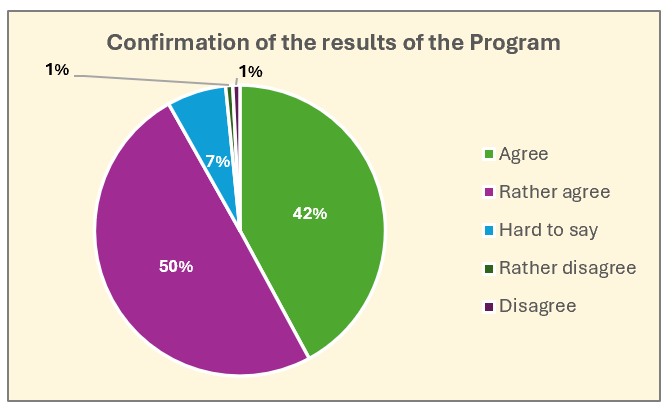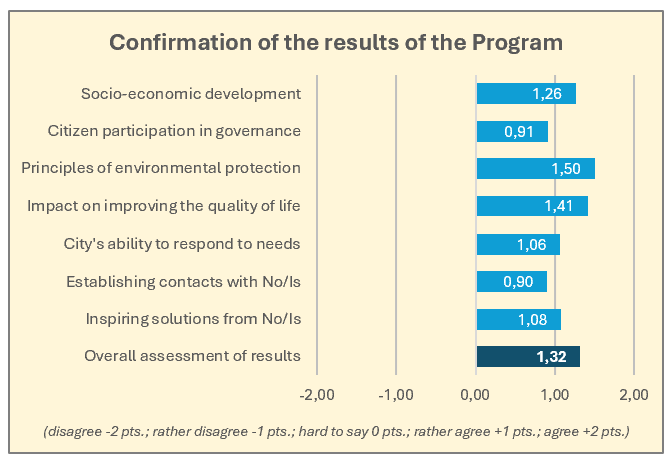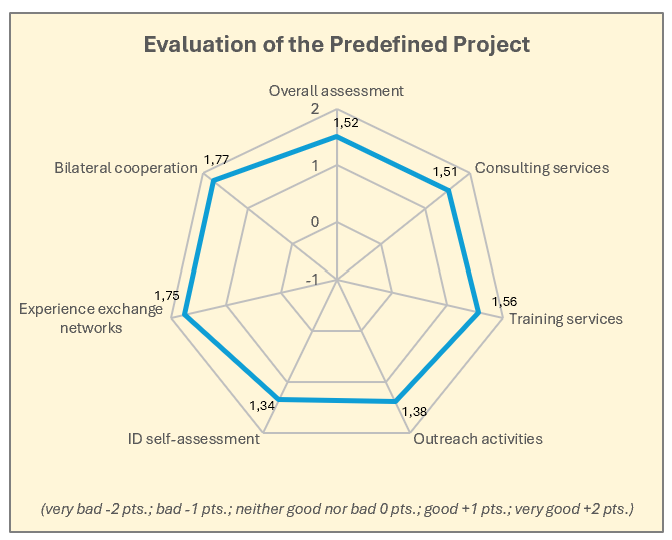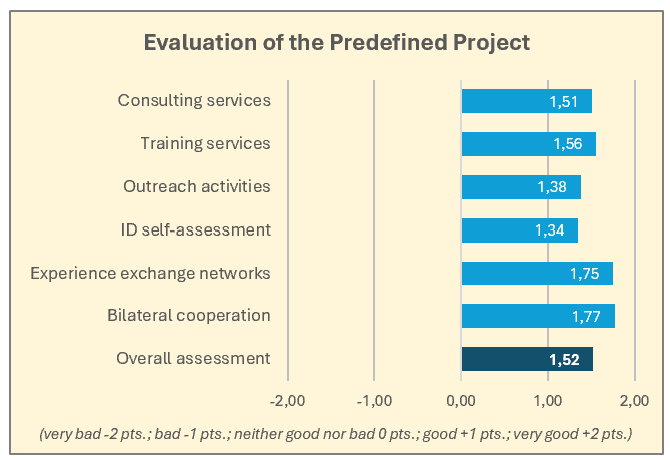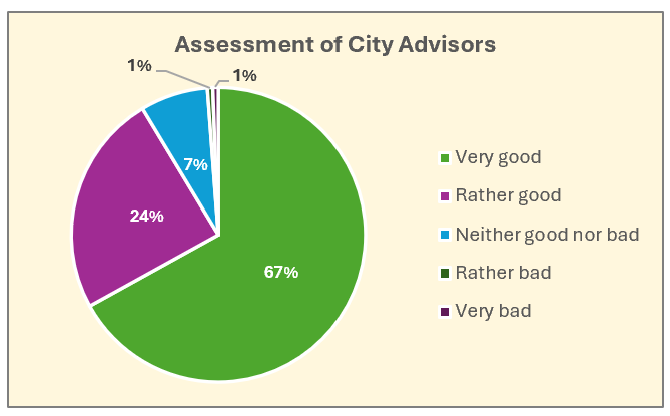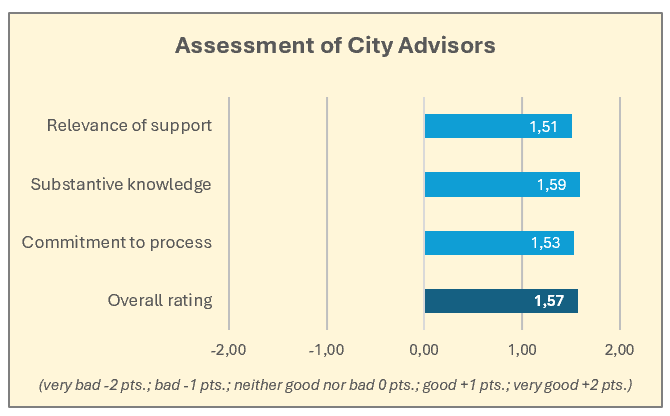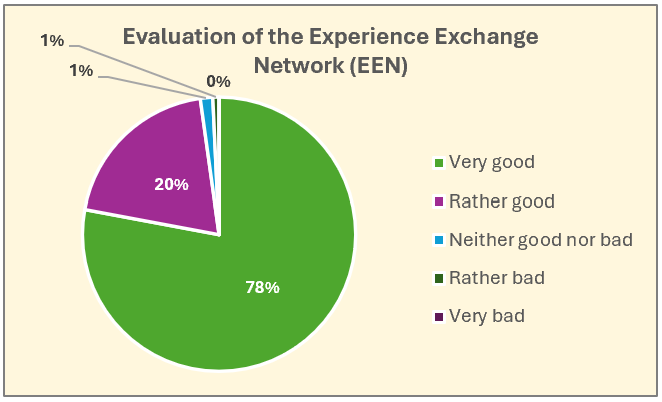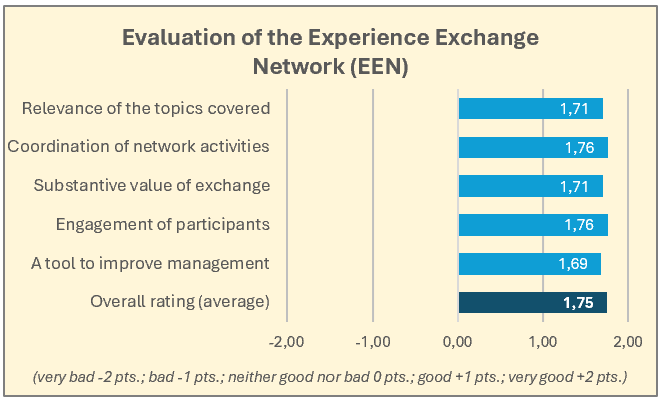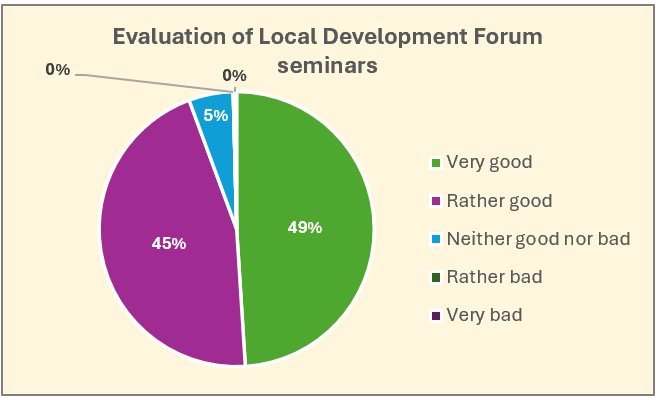More information
Description
The predefined project strengthens an institutional capacity of small and medium sized towns identified in Poland’s Strategy for Responsible Development. 54 cities received advisory assistance to elaborate Local Development and Action Plans addressing environmental, social, economic, demographic and good governance challenges. Based on these plans, 29 cities were selected to receive funding and tailored support to implement them.
The project activities include expert assistance; capacity-building for local government staff; monitoring of local development progress; methodology and implementation of self-assessments to measure initial and progressive levels of good governance and institutional capacity; know-how on good governance from an international organisation (OECD) and campaign to promote principles of integrated and participatory local development.
Inclusion of vulnerable groups, non-discrimination, gender equality, transparency and good governance are integral to the predefined project at all stages, i.e. planning, implementation and dissemination as well as in the activities of the 29 cities.
Within the predefined project the Norwegian Association of Local and Regional Authorities in cooperation with the beneficiaries provide expertise on local development by facilitating bilateral activities within partnerships between 29 PL cities and Donor municipalities from NO and IS. 17 such bilateral agreements were concluded. Moreover, within the framework of the pre-defined project, bilateral activities are carried out involving the remaining 12 beneficiaries for whom it was not possible to find a partner. Thanks to this, projects staff will be able to participate in study visits, internships and events in Poland and Norway.
The OECD provided expertise on good governance - drafting a local public governance review and operationalizing recommendations as well as supporting cities to adopt and use a self-assessment tool on good governance.
Summary of project results
According to the diagnosis formulated in the Strategy for Responsible Development (2018) - the essence of the development problems of medium-sized cities in Poland is their continuous loss of economic and social functions - as centres of services and development for the inhabitants of cities and rural areas in their surroundings - as a result of external systemic changes.
The process of socio-economic changes in the 1990s and 2000s resulted in, among others:
- Deindustrialisation, structural changes in local economies
- A decrease in the settlement attractiveness of medium-sized cities for young and active people - who move to large urban centres;
- Changes in the demographic structure - ageing population of medium-sized cities and depopulation in areas outside the main development centres;
- Weakened social ties - as a result of economic migration and deep cultural changes;
- Suburbanisation around major and medium-sized cities - exacerbating the imbalance rather than cohesion between urban and rural areas.
Consequences for local communities: Changes in demand for services and infrastructure; Increase in unit costs of service provision; Further adverse changes in economic potential and further loss of settlement attractiveness for young people.
- Objective of the Local Development Program: To support the socio-economic development of medium-sized cities in Poland.
Expected result: improvement of quality of life through acceleration of development processes, inclusion of residents and institutional development of local administration.
- Purpose and role of the Predefined Project (PP) – as a support for the Program Operator:
(1) Support beneficiary cities in the effective use of the grant part of the Local Development Program.
(2) To develop and test an integrated approach to urban development management: development of tools and working methods, and their wide dissemination.
(3) Strengthening bilateral relations between cities in Poland and in EEA countries.
Key features of the APC approach to implementing PP
Method: integrated approach to planning and implementation of the city
development program. Preparation of tools to support the work at each stage. Teamwork of advisors. Cooperation with partners in PP.
Different tasks in the 3 stages of the RL program:
(1) Preparation of the APC team - when cities were working on project outlines
(2) Working with 54 cities - assisting in the preparation of Local Development Programs (LDP) and Institutional Development Programs (IDP).
(3) Work with 29 beneficiary cities - assistance in implementation of IDP and LDP, dissemination of tools, exchange of experience, bilateral cooperation of cities from Poland – Norway – Iceland.
Local Development Programme – which covered:
1. activities aiming at counteracting direct effects of crisis trends - including matching the supply of services to demand and increasing the supply of those services on which the development and maintenance of the settlement attractiveness of the city with its surroundings (quality of life) depends - including social services, access to high-quality public space and infrastructure, creating conditions for the development of entrepreneurship, undertaking air and climate protection measures, improving accessibility, improving local transport, etc.
2. activities aimed at building a basis for endogenous development - based on local human, natural, technical and institutional resources. Cities were identifying local products and were planning for the development of local product chains and value-added chains, were focusing on building community identity, on building social capital of trust.
The principle proposed by the Association of Polish Cities was to strictly balance the cities'' projects from a financial point of view (i.e. ability to maintain operating costs of the built infrastructure) in a long-term perspective.
Institutional Development Programme – which included:
A set of organisational, training and organisational culture shaping activities that will prepare the employees and ways of working of the institutions for the implementation of the Local Development Programme - e.g. cooperation of departments and organisational units, teamwork, motivation of employees, simplification of information flow, other - Institutional Development states identified by means of the OECD self-assessment tool.
Activities in the Predefined Project - forms of support for cities
- Individual consulting - strategic and ongoing in the process of implementing the tasks of cities
• In-depth substantive consulting (e.g., finance, institutional development, other) - sectoral advisors
• Workshops, training, strategic development management tools (APC and IURD)
• Dissemination of management knowledge - "Local Development Forums" (48 online editions)
• Exchange of experience - "Experience Sharing Networks - Empirie" and networking meetings in Warsaw for cities participating in stage 3 of the LD program
• OECD recommendations and the "Self-Assessment of Institutional Development - eSAT" tool
• Supporting partnerships of Polish cities (17) with Norwegian and Icelandic partners
• Study visits, internships in Norwegian local governments, international conferences, Polish-Norwegian-Icelandic exchange of experience (in addition to individual city partnership relations)
Scale of activities in cities participating in the LD Program (2020 - 2024)
In 54 cities, 6,315 consulting and training services were delivered, including:
• 995 face-to-face meetings,
• 2,737 online conferences,
• 713 training workshops (including 149 online)
• 1,870 services of other types (preparation of analyses, opinions, thematic reports).
On the cities'' side, more than 34,800 participants (counted with repetition) took part in the activities.
Counting without repetition, 3,377 unique individuals used the services of APC and IURD, including 2,200 representatives of local governments (67%) and 1,177 representatives of external partners (33%).
Results of the LD Program:
As a result of Stage II of the program 54 cities prepared comprehensive Local Development Plans which covered jointly with over 1000 activities, of the total value exceeding 500 mln Euro.
Since the LD Program could provide only 100 mln Euro and for a limited number of cities therefore all these cities were able to use these plans to apply for other external funding from EU and national funds, which is a value added of the LD Program
Finally, as a result of the call for proposal 29 cities received grants. Since only 100 mln Euro was available, so each city received a grant of approx. 3,5 mln Euro.
As a result of Stage III of the LD Program all 29 cities successfully completed their program and implemented all activities, despite of problems emerging from Covid epidemics, impact of war in Ukraine and influx of refugees, as well as significant inflation of investment and maintenance / energy costs. Many towns has to supplement EEA grant with own funds to be able to complete the projects due to high inflation (2022-2024 over 25%)
The Predefined Project, besides providing comprehensive assistance to 29 cities in effective implementation of Local Development Plans, has produced significant outcomes in the area of institutional development of 29 cities and more widely in the national scale - by producing and disseminating tools and standards for integrated management and institutional development, including:
- Methodology and standard for diagnosis and strategic/operational planning (LDP) (developed by APC team)
• Diagnosis methodology and standard for preparing the Institutional Development Plan (developed by APC team)
• Local Development Monitor (https://monitorrozwoju.pl/ ) (developed by APC team)
• Platform and questionnaires for surveys of youth, entrepreneurs, local leaders (APC)
• Tool for analyzing the ability to finance investments and to maintain planned
infrastructure projects on an ongoing basis (developed by APC team)
• Tool for self-assessment of the state of institutional development "eSAT" (developed by OECD, and by APC team – the on-line version)
• Handbook "Data Management in Cities" (developed by the IURD team)
• M-GIS software - integrating urban data on a single online platform (developed by the IURD team)
• Calculator of expenditures and future benefits of municipal real estate management (developed by the IURD team)
Results of the Local Development Program and the Predefined Program in the opinion of participating cities: We asked about this the personnel of cities in the form of a anonymous opinion survey in March 2024
Results of the opinion survey: „Evaluation of assumptions behind Local Development Program, implementation of the Program and its results”.
A methodological note:
• Type of study: Internal evaluation
• Research method: online survey
• Survey conducted: 25.03.2024 - 18.04.2024
• Sample: 932 of the most active participants from 29 cities (authorities, officials, social partners - an average of 32 persons/city) were invited to the survey but answers remained anonymous
• Return: 393 persons completed the survey (total return of 42%).
• Questionnaire: Filtering questions were used - the respondent evaluated only those types of project Services of APC/IURD, which he/she used.
• Rating scale: 5-grade scale was used.
• Evaluation of project services: from "very good" (+2 points) to "very bad" (-2 points).
Assessment of the results of the "Local Development" Program
Assessment of the Predefined Project
Assessment of the work of city advisors (APC team)
Assessment of the Experience Sharing Network “Empirie”
Assessment of Local Development Forum online seminars;
Summary of bilateral results
As a result of close cooperation between the APC and KS, 16 Polish-Norwegian and 1 Polish-Icelandic municipal partnerships have been established since November 2021.List of PL-NO/IS partnerships:1.Jelenia Góra - Akureyri (Iceland)2.Hajnówka - Alta3.Jarocin - Ås4.Jarosław - Nordre Follo5.Łomża - Nordland County6.Nisko - Midt-Telemark7.Opoczno - Sunnfjord8.Ostrowiec Świętokrzyski - Sogndal9.Krosno – Øygarden10.Tomaszów Mazowiecki - Hamar11.Cieszyn - Halden12.Rydułtowy - Øvre Eiker13.Starachowice - Bergen14.Zawiercie - Møre og Romsdal15.Hrubieszów & Złotów - Elverum16.Piła – LørenskogThe number of meetings and participants is impressive. There were 91 visits in Poland and Norway with almost 600 participants. Additionally there were over 100 online meetings organised.Fields of cooperation included climate and nature protection, institutional development, support to local entrepreneurship development, social development issues, education, senior policy and housing. The cooperation took different forms – from onsite meetings and exchanges, through study visits, internship, job shadowing, to seminars and workshops.Despite efforts on the KS and APC side, there remained however still 12 Polish cities for which, for whom it was not possible to find partners in Norway and Iceland. These cities received a dedicated extended package of exposure to Norwegian local governments. The project was able to offer to these cities activities through which they also could have benefited from the experience of Norwegian municipalities. They had a possibility to take part in 4 study visits to Norway, in international conference on democracy and human rights, in bilateral conference on smart Cities and in 10 days internships in Norwegian municipalities.The bilateral cooperation component has been a great success and has resulted in the continuation of activities under the 2024-25 Bilateral Initiative (01.04.2024-28.02.2025).See Attachment.
